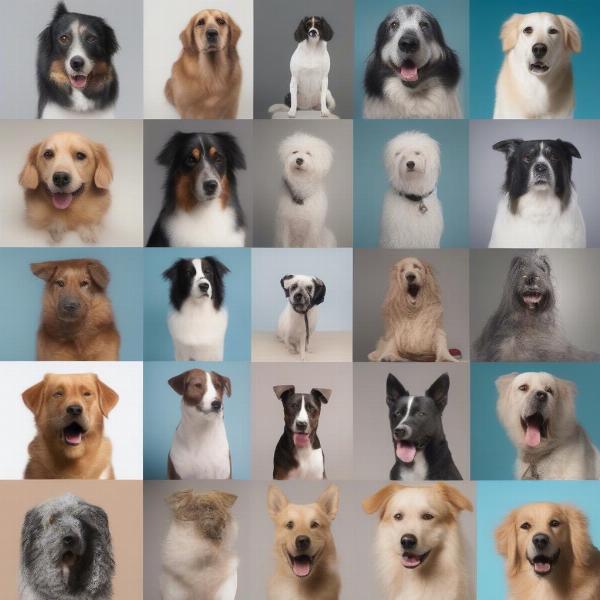The dog chest, more than just a cute, cuddly area to pet, plays a vital role in a dog’s overall health and well-being. Understanding its structure, function, and potential problems is crucial for responsible dog ownership. This guide delves into the importance of the dog chest, covering aspects from breed-specific variations to common health concerns and how to ensure your furry friend’s chest remains healthy and strong.
Breed Variations in Dog Chest Conformation
Just like humans, dogs come in various shapes and sizes, and their chest conformation is no exception. From the deep, barrel-shaped chest of a Bulldog to the slender, deep chest of a Greyhound, breed-specific variations are significant. These differences are often linked to the dog’s original purpose and can impact their susceptibility to certain health issues. For example, barrel chest dogs, like Bulldogs, are more prone to breathing difficulties, while deep-chested breeds, like Great Danes, are at a higher risk of bloat. Understanding these breed-specific characteristics can help you anticipate potential health concerns and take preventative measures.
Common Health Issues Related to the Dog Chest
Several health issues can affect a dog’s chest, ranging from minor injuries to serious conditions. One of the most concerning is bloat, also known as Gastric Dilatation-Volvulus (GDV), a life-threatening condition that can affect deep-chested breeds. Other common chest problems include kennel cough, pneumonia, heart disease, and injuries to the ribs or sternum. Recognizing the symptoms of these conditions, such as coughing, difficulty breathing, lethargy, and loss of appetite, is essential for early diagnosis and treatment.
 Common Dog Chest Problems in Dogs
Common Dog Chest Problems in Dogs
Maintaining a Healthy Dog Chest
Maintaining a healthy dog chest involves a combination of preventative measures and attentive care. Providing your dog with a balanced diet, regular exercise appropriate for their breed and age, and a safe environment can significantly reduce the risk of many chest-related problems. Furthermore, regular veterinary check-ups are crucial for early detection of potential health issues.
Protecting Your Dog’s Chest
Sometimes, added protection is necessary, especially for dogs who are active or participate in dog sports. A dog chest protector can offer an extra layer of defense against impacts and injuries. Similarly, a well-fitted dog chest harness can provide better control and distribute pressure more evenly across the chest, preventing strain and discomfort.
Identifying Potential Chest Problems: What to Look For
Being aware of the signs and symptoms of chest-related issues in dogs is vital for prompt veterinary intervention. Changes in breathing patterns, such as rapid, shallow breathing or labored breathing, can indicate respiratory problems. Coughing, especially if persistent or accompanied by other symptoms like lethargy or loss of appetite, warrants a veterinary visit. Similarly, any noticeable swelling, pain, or discomfort in the chest area should be addressed immediately.
“Early detection is key in managing chest-related health problems in dogs,” says Dr. Emily Carter, DVM. “Regular check-ups and paying attention to subtle changes in your dog’s behavior can make a significant difference in their overall health and well-being.”
Conclusion
The dog chest is more than just a part of their anatomy; it’s a vital indicator of their overall health. By understanding the various aspects of dog chest health, from breed-specific variations to common health concerns and preventative measures, you can ensure your furry friend lives a long, healthy, and happy life. Remember to consult with your veterinarian for any concerns regarding your dog’s chest health. Early diagnosis and treatment are crucial for successful management and recovery.
FAQ
-
What is the most common chest problem in dogs? Coughing is a common symptom of various chest-related issues, from kennel cough to more serious conditions like pneumonia or heart disease.
-
How can I protect my dog’s chest during activities? A dog chest protector or a properly fitted dog chest harness can offer added protection during activities.
-
What are the signs of bloat in dogs? Bloat symptoms include a distended abdomen, restlessness, excessive drooling, and attempts to vomit without success. It’s a medical emergency requiring immediate veterinary attention.
-
Are certain breeds more prone to chest problems? Yes, deep-chested breeds like Great Danes and barrel-chested breeds like Bulldogs are more susceptible to certain chest-related conditions.
-
How often should I take my dog for a chest check-up? Annual veterinary check-ups are recommended for most dogs, but more frequent visits may be necessary for breeds predisposed to chest problems.
-
What should I do if I notice my dog having difficulty breathing? Difficulty breathing is a serious symptom and requires immediate veterinary attention.
-
Can diet affect a dog’s chest health? Yes, a balanced diet is crucial for maintaining a healthy weight and supporting overall health, including the cardiovascular system.
ILM Dog is your trusted partner in dog care, offering expert advice and resources on everything from breed selection and health to training, nutrition, and grooming. We are committed to providing dog owners with the information they need to ensure their furry companions live happy, healthy lives. Contact us at [email protected] or +44 20-3965-8624 for personalized guidance and support. ILM Dog offers a wide selection of products and accessories, including black dog chester and information on services like dog walker winchester.